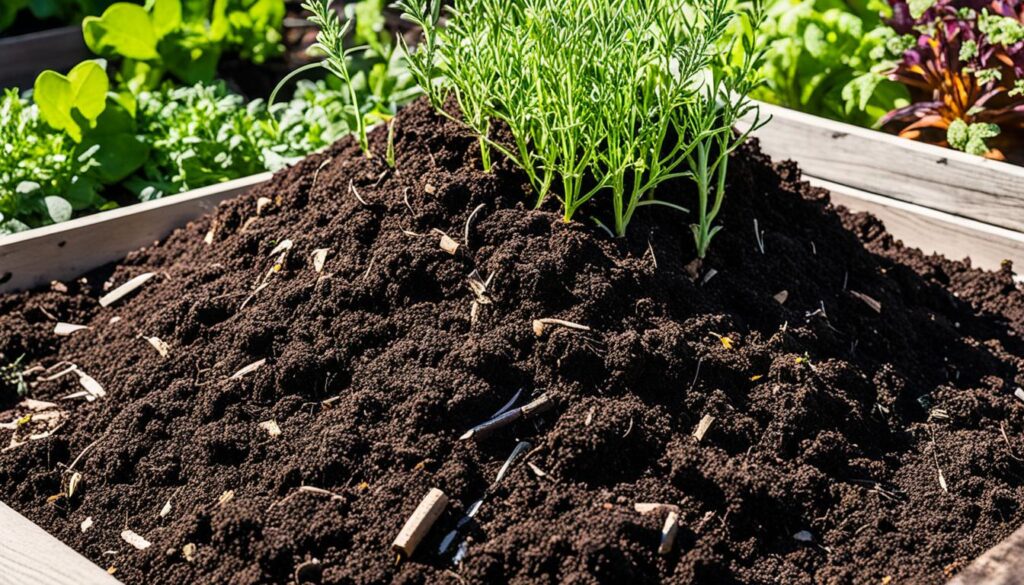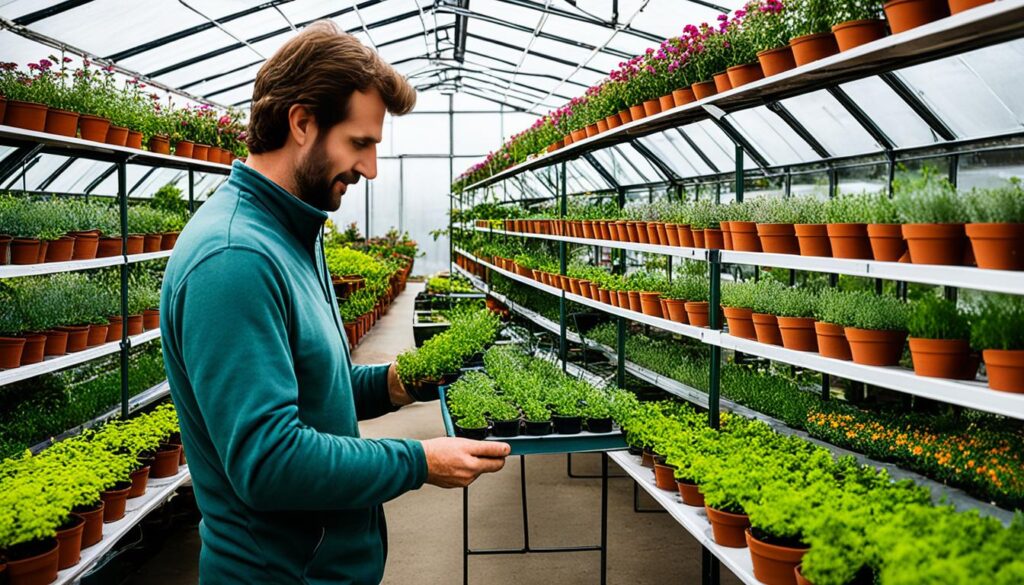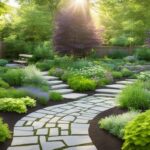Choosing the Perfect Location for Your Herbal Garden
Are you ready to start a herb garden but don’t know where to begin? The secret to a successful herb garden is picking the right spot. This spot must meet the needs of your herbs. Wondering where to plant your herbs for the best results? Learn how to find the perfect spot for your herbal garden.
Key Takeaways
- The perfect location for an herb garden should provide the right amount of sunlight exposure for your chosen herbs.
- Proximity to the kitchen is crucial for easy access and harvesting of fresh herbs.
- Proper soil preparation, including adding compost, is essential for healthy herb growth.
- Herbs can thrive in both garden beds and containers, depending on your available space.
- Perennial and annual herbs have different location requirements, so plan your garden accordingly.
Introduction to Herb Gardening
Growing an herb garden at home is rewarding. You get fresh, flavorful ingredients for cooking. Plus, many herbs have medicinal properties for natural remedies and tinctures.
Benefits of Growing an Herb Garden
- Save money by eliminating the need to purchase expensive pre-packaged herbs from the grocery store
- Enhance the flavor of your home-cooked meals with the use of fresh, aromatic herbs
- Beautify your outdoor space and attract pollinators like bees and butterflies
- Enjoy the therapeutic benefits of gardening and connect with nature
- Explore the health benefits of herbs and create your own natural remedies
Culinary and Medicinal Uses of Herbs
Herbs are versatile plants for the kitchen and health. Common kitchen herbs like basil, rosemary, and thyme add flavor and have health benefits. For example, basil fights inflammation, and rosemary boosts brain function and memory.
Medicinally, lavender helps with relaxation and anxiety, and mint soothes the stomach. Growing your own herb garden gives you a natural way to use herbs in your life.
“An herb garden is a mini-apothecary at your fingertips, offering both culinary and medicinal benefits.”
Selecting the Ideal Location
Choosing the right spot for your herb garden is crucial. Think about how much sun your herbs need and how close it is to your kitchen.
Sun Exposure Requirements for Herbs
Most herbs love full sun, needing at least 6 hours of direct sunlight daily. Some, like mint and parsley, can do well in partial shade. But, giving them more sun is usually better.
Put your herb garden where it gets lots of sunlight. This way, your plants will grow well and give you plenty of fresh herbs.
Proximity to the Kitchen
It’s smart to put your herb garden near the kitchen. This makes it easy to pick and use the herbs often. Try to place it near the kitchen door you use the most.
This way, you can quickly grab some fresh herbs for your cooking. By thinking about your herbs’ sun needs and kitchen access, you’ll find the perfect spot for your garden.
Growing Herbs in Planters
Creating an herb garden in containers is easy and doesn’t take up much space. It lets you control the soil and drainage. Plus, you can move the herbs to get the best sun.
Advantages of Container Gardening
Growing herbs in pots has many benefits of herb containers:
- Easy to manage and maintain
- Ability to customize soil and drainage
- Mobility to optimize sun exposure
- Ideal for small spaces like balconies or patios
Choosing the Right Planter and Potting Mix
For your herb garden planter, pick one that’s at least 12 inches deep with good drainage holes. Use a high-quality, well-draining potting soil for herbs. This type of soil is made for containers or raised beds and is better for herb roots. Choosing the right soil and planter helps your best herbs for containers grow well.
By following these tips for growing herbs in pots, you can enjoy the benefits of herb containers. You’ll have a beautiful herb garden in containers on your patio or balcony.
Preparing the Garden Bed
Creating a thriving herb garden starts with the soil. Whether you’re planting in the ground or raised beds, getting the soil right is key. It’s crucial for your herbs to grow well and stay healthy.
Amending the Soil with Compost
Most herbs love soil that drains well and is full of nutrients. Spread a 3-inch layer of compost for herb garden over the area. Then, use a rake to mix it into the top 6 inches of the ideal soil for herb garden.
Compost does more than just add nutrients. It also makes the soil better at holding water and air, which is great for your herbs.
| Soil Amendment | Benefits |
|---|---|
| Compost |
|
Don’t till the soil if you’re using sheet mulching or containers. Just make sure the soil is rich in nutrients and drains well. This will help your herbs grow strong and healthy.

“Healthy soil is the foundation for a thriving herb garden. By amending the soil with compost, you’re providing your plants with the essential nutrients and improving the overall growing conditions.”
Perfect Location for Herbal Garden
Finding the right spot for your herb garden is crucial. The best place to put herb garden should offer great growing conditions. Look for a spot that gets at least 6 hours of direct sunlight per day. Most herbs love full sun.
Choose a spot near your kitchen for your ideal herb garden spot. This way, you can easily grab fresh herbs for cooking. If your yard has poor soil or little space, consider raised beds or planters.
Think about the needs of each herb you want to grow. Some herbs, like mint and lemon balm, can spread quickly. Keep these in their own planter or raised bed to stop them from taking over.
By picking the perfect herb garden placement, you set up a garden that’s full and easy to reach. You’ll have a steady supply of fresh, tasty herbs all season.
| Herb | Sun Exposure | Soil Preference |
|---|---|---|
| Basil | Full sun | Rich, well-drained |
| Rosemary | Full sun | Dry, well-drained |
| Thyme | Full sun | Dry, sandy |
| Parsley | Partial shade | Moist, well-drained |
Perennial Herbs for Zone 6
Gardeners in USDA Hardiness Zone 6 have many perennial herbs to choose from. These herbs come back every year with little work. Some top picks include chives, thyme, sage, lavender, mint, and rhubarb.
Chives, Thyme, and Sage
Chives and thyme are easy to care for and useful in cooking and as garden decorations. They have bright green leaves and pretty flowers. Sage is also great, being tough and loving dry soil. It has beautiful leaves and flowers that look great in any garden.
Lavender, Mint, and Rhubarb
Lavender and mint are loved for their lovely smells and calming effects. They make the garden look and smell great. Rhubarb is a special herb for cooking, used in pies and jams.
Adding these best perennial herbs for cold climates ensures a steady supply of fresh herbs for years.
Annual Herbs for Zone 6
While perennial herbs are key in a Zone 6 garden, annual herbs play a big role too. Basil, cilantro, dill, and parsley love the warm summer and can be grown every year. They are softer than perennials but bring fresh flavor that goes well with the tougher perennials.
Adding both annual and perennial herbs to your garden means you’ll have herbs all year. Annuals bring new colors and smells to your garden. They make your garden more exciting.
Best Annual Herbs to Grow in Zone 6
- Basil
- Cilantro
- Dill
- Parsley
- Chervil
- Borage
These annuals not only taste great but also draw in helpful insects like pollinators. By choosing these annuals for Zone 6, you’ll have plenty of fresh herbs all year.
“Annual herbs are the perfect complement to a perennial herb garden, providing a burst of flavor and vibrant color throughout the growing season.”
| Annual Herb | Planting Time | Harvest Time | Culinary Uses |
|---|---|---|---|
| Basil | Spring | Summer | Pasta, pesto, salads |
| Cilantro | Spring | Summer | Mexican, Indian, and Asian dishes |
| Dill | Spring | Summer | Pickles, dips, and salads |
| Parsley | Spring | Summer | Garnishes, sauces, and soups |
Adding these annual herbs for Zone 6 to your garden makes it lively and tasty. Just remember to put them in a sunny spot and water them often for the best look and taste.
Sourcing Herb Plants and Seeds
Starting an herb garden means you can choose between buying plants or growing them from seeds. Each method has its own benefits. The best choice depends on what you need and like.
Local Nurseries for Herbs
Local nurseries are great for finding healthy herb plants that fit your area. They get their plants from trusted suppliers and know which ones will do well in your climate. You can see the plants before buying and pick ones that look good and are healthy.
Online Retailers for Herbs
If you like shopping online, there are many good websites that sell herb seeds and plants. Richters Herbs is one example, offering a wide variety of herbs right to your home. This is great if you can’t find certain herbs locally or want to try new ones.
Choosing a reliable supplier is key for a successful herb garden. With the right plants and some care, you’ll enjoy the many perks of growing your own herbs.
| Local Nurseries for Herbs | Online Retailers for Herbs |
|---|---|
| Ability to inspect plants in person | Wider selection of herb varieties |
| Knowledgeable staff can provide guidance | Convenient delivery to your door |
| Plants are well-suited to local climate | Option to purchase herb seeds or starter plants |

“Growing your own herbs is a rewarding experience that can elevate your cooking and provide natural health benefits. With the right resources, you can easily establish a thriving herb garden, regardless of your gardening experience.”
Planting and Growing Tips
After picking the perfect spot and getting your herbs, it’s time to start how to plant an herb garden. Make sure to water them well and give them enough soil space for their roots. Herbs like well-draining soil and moderate, steady moisture. Don’t let the soil get too dry.
Watering and Fertilizing
Herbs don’t need a lot of fertilizing, but a little organic fertilizer now and then helps. It’s important to water them regularly for growing herbs. Keep the soil moist but not too wet.
Harvesting and Pruning
- Regular harvesting keeps your garden productive.
- Cutting your plants makes them grow more and stops them from flowering too soon.
- Pruning your herbs often keeps them looking good and promotes more growth.
Follow these tips for growing herbs to enjoy a garden full of flavor all season.
“The secret to growing a thriving herb garden is in the details – from proper watering and fertilizing to regular harvesting and pruning.”
Companion Planting for Herbs
Companion planting is a big help for a thriving herb garden. By pairing herbs with the right plants, you make a garden that’s diverse and easy to care for. This approach helps both your herbs for cooking and those for medicine.
One big plus of companion planting is keeping pests away. Marigolds, for example, keep nematodes away, which are bad for plants. Borage attracts bees and lacewings, which pollinate your herbs and fight off pests.
But it’s not just about fighting pests. Some herbs make their neighbors grow better and taste better too. Rosemary, thyme, and lavender do well with veggies. Their strong smells keep pests away and make the veggies taste better.
When picking plants to go with your herbs, think about what they need to grow. Choose plants that like the same sunlight, water, and food. This way, you get a garden that’s full of life and tastes great.
- Marigolds: Repel nematodes, a type of soil-dwelling pest
- Borage: Attracts beneficial insects like bees and lacewings, which help pollinate herbs
- Rosemary, thyme, and lavender: Can enhance the growth and flavor of neighboring vegetable crops
“Companion planting is like a symphony of plants, each playing its own unique role to create a harmonious and productive garden.”
Adding companion plants to your herb garden brings many benefits, like fighting pests and making flavors better. Try companion planting and see your herb garden thrive.
Conclusion
Starting a thriving herb garden begins with picking the right spot. Make sure it gets enough sun, has good soil, and is easy to reach. This way, you’ll have a garden that’s full of fresh, tasty herbs with little work.
Choose between perennial and annual herbs or go for ones that can handle the cold in Zone 6. An herb garden adds a lot to your home’s look and is great for cooking and health.
With some planning and care, your herb garden will be a treasure for many years. This guide has given you the best tips for a successful herb garden. It’s all about making a beautiful, lasting garden in your backyard.
Follow this article’s advice to grow a garden full of herbs that make your cooking better and your life healthier. Enjoy gardening and the benefits of having fresh herbs right at your fingertips.
FAQ
What are the key factors to consider when choosing the location for an herb garden?
Can I grow herbs in containers or planters?
How do I prepare the soil for an herb garden?
What are some good perennial herb options for USDA Hardiness Zone 6?
What annual herbs should I consider for my Zone 6 herb garden?
Where can I source healthy herb plants and seeds for my garden?
How do I properly plant and care for my herb garden?
What companion plants work well with herbs?
Source Links
- https://www.heirloomsoul.com/blog/the-ultimate-herb-garden-for-zone-6b – The Ultimate Herb Garden for Zone 6 — Heirloom Soul Florals
- https://www.gardenary.com/blog/how-to-grow-herbs-in-a-small-space – How to Grow Lots of Herbs in a Small Space • Gardenary
- https://freckledcalifornian.com/2019/11/13/basic-guide-to-growing-herbs/ – How to Start an Herb Garden
- 10 Must-Have Blooms for Your 2025 Garden
- The Health Advantages of Gardening You Need to Know
- How to Create a Small Vegetable Garden Layout Plan: A Beginner’s Guide
- DIY Garden Projects for Small Spaces: Upcycling Ideas to Maximize Your Garden
- Watering Techniques for Small Gardens: Ensuring Your Plants Thrive
- Small Border Plants for Landscaping: Adding Beauty and Functionality to Your Garden
- Year-Round Small Space Gardening: Seasonal Planting Tips for Maximum Harvest
- Essential Tools for Small-Space Gardening: What You Really Need
- The Ultimate Guide to Container Vegetables: What to Grow in Small Spaces
- Budget-Friendly Gardening: How to Create a Thriving Garden on a Tight Budget
- How to Optimize Sunlight in Small Gardens: Tips for Better Plant Growth
- DIY Vertical Planters: Creative Ideas for Small Space Gardening
- Companion Planting for Small Vegetable Gardens: Boost Growth and Deter Pests
- Container Gardening Essentials: Choosing the Right Pots, Soil, and Plants
- Vertical Gardening Techniques: Maximizing Your Small Space with Climbers and Vines
- How to Build a Raised Bed Garden in a Small Backyard: Step-by-Step Guide
- The Best Vegetables for Small-Space Gardens: High-Yield Varieties You Need to Grow
- Smart Vegetable Garden Layouts for Small Spaces: Maximizing Your Green Thumb in Compact Areas
- 40. Best Practices for Managing a Sustainable Garden Year-Round
- Building a Wildlife Pond for Biodiversity
- Advanced Techniques in Sustainable Gardening
- How to Create a No-Till Garden
- The Mental Health Benefits of Gardening
- Using Technology to Enhance Sustainable Gardening
- Getting Certified Organic: Steps and Benefits

Leave a Reply